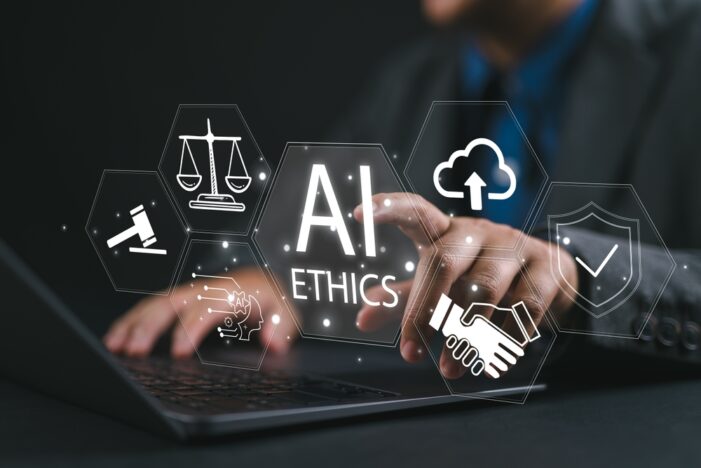Artificial intelligence (AI) is transforming how we live, work, and make decisions. From virtual assistants to automated hiring systems, AI is shaping industries and influencing society in ways we’ve never seen before. This is why it’s important to understand AI ethics.
But as the technology grows, so do the questions about fairness, privacy, accountability, and transparency. Understanding AI ethics is no longer just for developers or policymakers, it’s essential for every user.
This guide explores what AI ethics really means, why it matters, and how individuals and organisations can use AI responsibly, as knowing the basics of ethical AI use is key to building trust and avoiding harm.
What is AI ethics?
AI ethics refers to the moral principles and guidelines that help ensure artificial intelligence systems are developed and used responsibly. It focuses on fairness, transparency, accountability, and respect for human rights. In simple terms, AI ethics asks: how can we make sure AI benefits everyone without causing unintended harm?
While AI can improve decision-making and productivity, it can also amplify bias, invade privacy, or make decisions that lack human empathy. Ethical AI seeks to balance innovation with responsibility.
Why AI ethics matters
AI systems learn from data, and data often reflects human bias. When algorithms are trained on biased or incomplete datasets, they can unintentionally discriminate, reinforce stereotypes, or exclude certain groups.
For example, facial recognition software has been shown to perform less accurately on darker skin tones, while AI-based recruitment tools have sometimes favoured certain demographics over others.
AI ethics matters because these outcomes affect real people. Ethical frameworks ensure that developers, companies, and users stay accountable and minimise harm. They also build trust; people are more likely to adopt and support AI systems that are transparent and fair.
Key principles of AI ethics
- Fairness – AI should not discriminate. Systems must be trained on diverse data to ensure equal outcomes across gender, race, and background.
- Transparency – Users should understand how AI makes decisions. This includes clear explanations of how data is collected and used.
- Accountability – Developers and organisations must take responsibility for the decisions their AI systems make.
- Privacy – Protecting user data and preventing misuse is fundamental.
- Safety and reliability – AI should function as intended, without causing harm or producing unsafe results.
- Human oversight – Machines should assist, not replace, human judgment in sensitive areas like healthcare, finance, and law enforcement.
How AI bias happens
AI bias occurs when algorithms learn patterns from skewed or incomplete datasets. For example, if a machine learning model is trained on data that mostly includes one demographic, it may produce inaccurate results for others. Bias can also arise from flawed data collection, human assumptions, or the way an algorithm is designed.
Understanding how bias forms helps users ask the right questions and demand better transparency from AI tools.
How users can apply AI ethics in everyday life
- Read before you agree – Always review an app or AI tool’s privacy policy to understand how your data will be used.
- Question recommendations – If an AI system suggests something that feels off, don’t accept it blindly. Critical thinking is key.
- Support responsible companies – Choose products and platforms that commit to transparency and ethical data practices.
- Learn about your rights – Stay informed about data protection laws like the GDPR and local privacy regulations.
- Advocate for fairness – Encourage open discussions about bias, accountability, and inclusion in technology.
The role of regulation in AI ethics
Governments and international bodies are beginning to set rules for responsible AI use. The European Union’s AI Act, for instance, categorises AI systems by risk and enforces strict guidelines for high-risk applications. In Africa and Asia, countries are drafting frameworks to ensure AI supports development without infringing on rights.
These regulations are vital to standardising ethical practices globally, ensuring AI remains a tool for progress, not exploitation.
FAQs about AI Ethics
What is AI ethics and why is it important?
AI ethics refers to the principles that guide the responsible development and use of artificial intelligence. It ensures that AI systems are fair, transparent, accountable, and respect human rights.
How does AI bias occur?
AI bias occurs when algorithms are trained on data that is incomplete, unbalanced, or reflects human prejudice. This can lead to unfair or inaccurate outcomes. Ethical AI design helps identify and correct such biases early.
What are the main principles of AI ethics?
The core principles of AI ethics include fairness, transparency, accountability, privacy, safety, and human oversight. These values guide developers and users to ensure AI systems serve people responsibly and do not cause unintended harm.
Can everyday users influence AI ethics?
Yes. Everyday users play an essential role by choosing products and services that prioritise ethical practices, reading privacy policies, and questioning AI-generated recommendations. Users can also advocate for stronger regulations and push companies to be more transparent about how their AI works.
How can I use AI tools responsibly?
To use AI responsibly, always understand what data a tool collects, question its outputs, and avoid sharing sensitive information unnecessarily. Choose platforms that clearly explain their algorithms and data use. Being informed and cautious helps you benefit from AI without compromising ethics or privacy.






